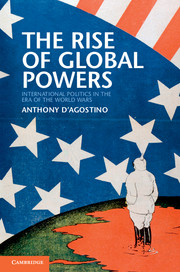Book contents
- Frontmatter
- Contents
- Maps
- Acknowledgements
- Introduction
- 1 The great powers at the dawn of world politics
- 2 Global origins of World War I: from the China scramble to the world crisis of 1904–1906
- 3 Global origins of World War I: a chain of revolutionary events across the world island
- 4 Balance and revolution, 1914–1918
- 5 A ragged peace, 1919
- 6 Scramble for Eurasia, 1919–1922
- 7 Drastic acts of unhappy powers, 1922–1923
- 8 Storms in the lull, 1924–1927
- 9 Politics and economics of the great slump, 1928–1933
- 10 A vogue for national economy
- 11 Mussolini’s moment, 1933–1935
- 12 The global civil war, 1936–1937
- 13 Last years of peace, 1937–1939
- 14 The European war, 1939–1941
- 15 The world war
- 16 Balance and hegemony
- Maps
- Notes
- Index
8 - Storms in the lull, 1924–1927
Published online by Cambridge University Press: 05 June 2012
- Frontmatter
- Contents
- Maps
- Acknowledgements
- Introduction
- 1 The great powers at the dawn of world politics
- 2 Global origins of World War I: from the China scramble to the world crisis of 1904–1906
- 3 Global origins of World War I: a chain of revolutionary events across the world island
- 4 Balance and revolution, 1914–1918
- 5 A ragged peace, 1919
- 6 Scramble for Eurasia, 1919–1922
- 7 Drastic acts of unhappy powers, 1922–1923
- 8 Storms in the lull, 1924–1927
- 9 Politics and economics of the great slump, 1928–1933
- 10 A vogue for national economy
- 11 Mussolini’s moment, 1933–1935
- 12 The global civil war, 1936–1937
- 13 Last years of peace, 1937–1939
- 14 The European war, 1939–1941
- 15 The world war
- 16 Balance and hegemony
- Maps
- Notes
- Index
Summary
The year 1923 had seen an attempt to rerun the Armistice of 1918. This time the French invaded Germany and tried in essence to undo the work of Bismarck. Whereas in 1918 those on the Allied side who feared the chaos and possible dismemberment that might befall Germany in defeat had warned about the threat of revolution and the spread of Bolshevism into Central Europe, in 1923 Poincaré had acted as if he feared none of these things. For a few months after the fall of the Cuno government it even appeared that he had got his way militarily and politically. There only remained the problem of dealing with the flight of French capital and the international assault on the franc. Only when it became clear that no help would be forthcoming from the British or American banks as long as French troops enforced French interests in the Ruhr did it also become obvious that Poincaré had not won anything. In fact he had suffered a crushing defeat, the “definitive interwar defeat” for French policy, as one historian puts it.The French now came to the grim realization that they could not force things with Germany, even when they were not resisted militarily. The Germans had answered the French invasion by the threat to collapse, with parts of the country falling into the hands of Communists and other parts into the hands of Ludendorffian nationalists such as Hitler. Moreover, the crisis of the mark soon also became a crisis of the franc. The conflict between France and Germany had all the possibilities of developing into a world economic collapse. The leading financial forces of Britain and the United States had every incentive to rush to the rescue, which they were shortly to do, but the dire situation did not prevent them from imposing as a condition for the much needed loans to France that it end its policy of attempting to pacify Europe by force. That was in effect an end to the Versailles System in the form it had been known since 1919. Germany was still expected to pay but this was not something to which it was obliged by necessity. It had to be offered incentives to pay. It had to do so out of a desire to live at peace with its neighbors in a new Europe. Its own national interest had to be appealed to.
- Type
- Chapter
- Information
- The Rise of Global PowersInternational Politics in the Era of the World Wars, pp. 190 - 214Publisher: Cambridge University PressPrint publication year: 2011

